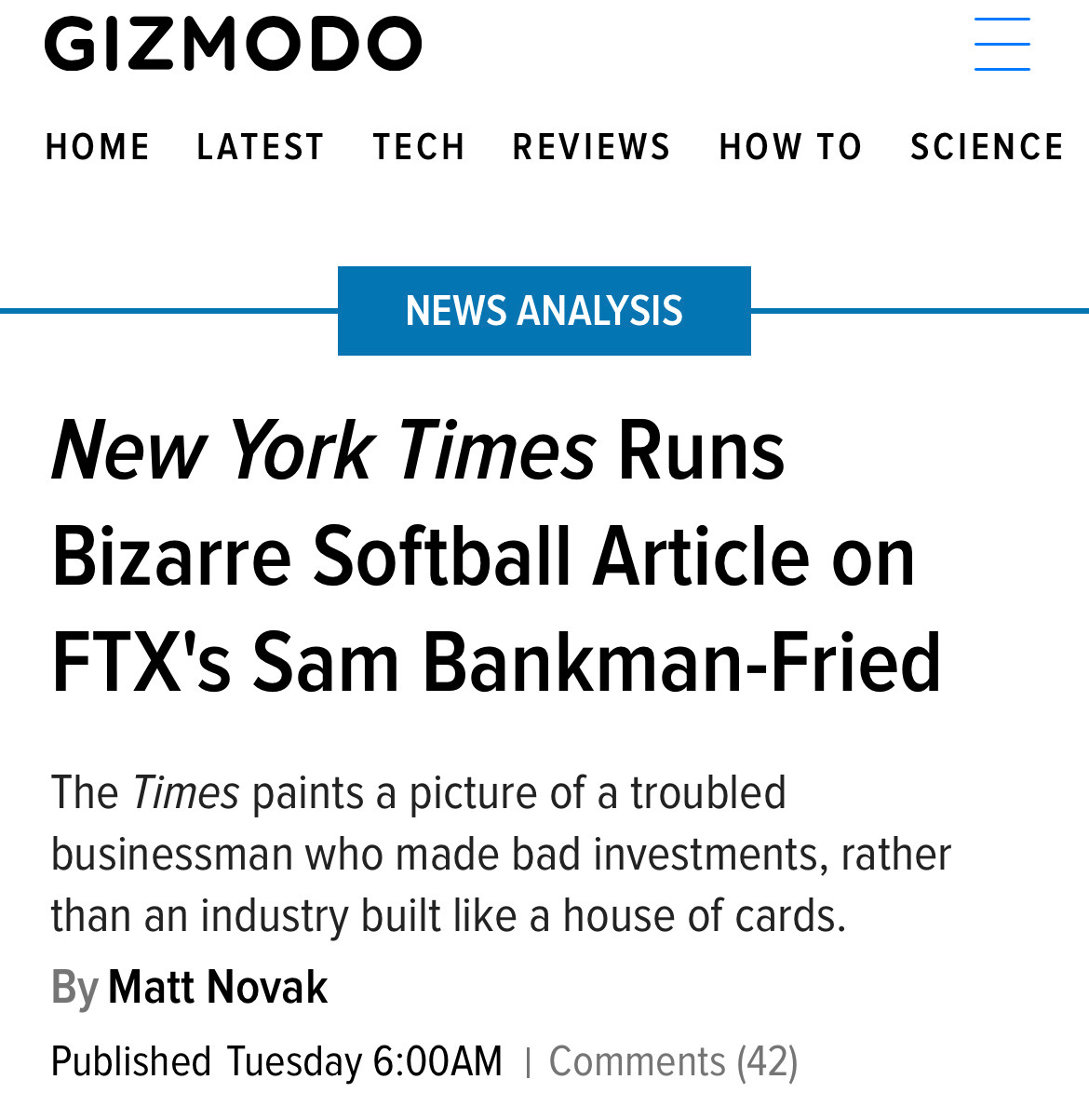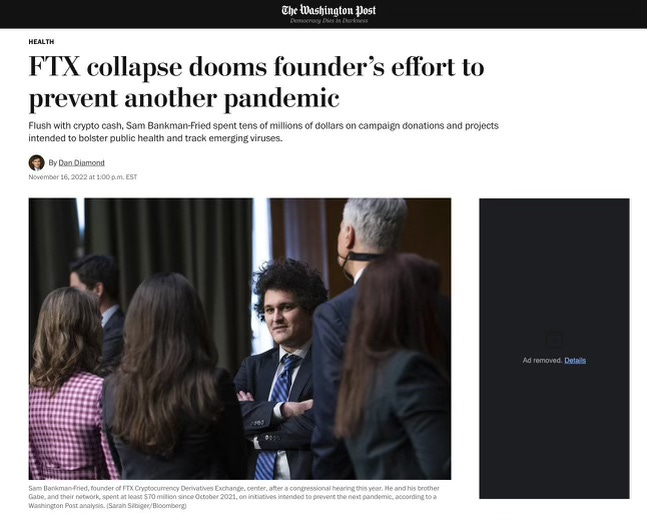Citizen reporting beats legacy media on a crucial, complex story (yet again)
While the New York Times et al offer puffery on Sam Bankman-Fried and the FTX collapse, expert outsiders sift through the wreckage and get to the truth; this is Twitter and Substack at their best
Elon Musk was proud of his $44 billion baby this morning.
—
Musk is right.
Fourteen years ago, when Bernie Madoff’s massive hedge fund collapsed, the New York Times and other elite media aggressively dug into what had happened - and why and how regulators had failed to stop it. I know - I was part of the Times team.
—
By this point, business reporters were experienced covering financial collapse. Along with al Qaeda and Iraq, Wall Street’s various meltdowns were the story of the 2000s, starting with the technology stock crash in 2000, running through Enron and the other giant accounting frauds, and culminating in the bank crisis and Madoff.
The most crucial element in covering these failures and frauds:
Don’t believe what they tell you.
Financial companies depend on leverage - borrowing from other institutions against their customer deposits. Leverage inherently means risk. Even a solvent company can break if too many customers or counterparties want their money back all at once. Management has to make sure that doesn’t happen; it has to keep confidence high at any cost.
Frauds depend on opaque accounting, accounting that no one from the outside can challenge or in some cases even understand. Complexity is the grifter’s friend.
Yet at its heart the fraud always runs the same way: cash leaves the balance sheet, and assets that aren’t really assets take its place. Those “assets” can be crypto tokens or prebooked profits on future electricity sales or capitalized software development costs or almost anything else. What they have in common is that they cannot be turned back into cash quickly - or sometimes at all.
Thus managements at complex financial companies have both the motive and the opportunity to spin, if not outright lie.
And if a collapse comes, they have every reason to hide their roles in what’s happened, and to blame malign outside forces for their problems - everything would have been fine if I’d just had a little more time, time to unwind my losing position, time for my investment to recover, time to raise more cash, time to flee to Argentina…
—
This is financial and investigative reporting 101.
But the Times and other elite media outlets have failed miserably at it in the case of FTX, the cryptocurrency exchange that collapsed and filed for bankruptcy last week, and Sam Bankman-Fried, FTX’s founder and majority owner.
I’ll explain the somewhat complicated details of what FTX and Alameda Research, its associated hedge fund, were doing and why they went bust in another Substack. But understand for now that FTX appears by the admission of its own executives to have used billions of dollars in customer deposits to cover losses at Alameda as well as other spending. This is theft on a massive scale, and bankruptcy is now the least of Bankman-Fried’s problems; federal prosecutors have reportedly already opened an investigation.
Yet the Times, Washington Post, and other outlets have so far treated Bankman-Fried and other FTX executives with kid gloves. On Monday, the Times allowed SBF to plead his case in an interview in which it barely challenged him.
As Gizmodo, a technology and science journalism Website, explained:
The new article in the New York Times by David Yaffe-Bellany lays out the facts in ways that are clearly beneficial to SBF’s version of the story and leaves many of his highly questionable assertions without proper context or even the most minimal amount of pushback. The result isn’t to illuminate the shadowy world of crypto. It reads like if the Times had conducted an interview with Bernie Madoff after his ponzi scheme collapsed and ultimately suggested he just made some bad investments.
The Washington Post embarrassed itself even more thoroughly, running an article Wednesday in which it suggested the main reason to worry about the FTX bankruptcy was that it might hurt “pandemic preparedness,” one of Bankman-Fried’s pet projects.
(Investors got a haircut, Sam not so much!)
—
Why haven’t reporters at the Times and elsewhere pressed the story?
An excellent question.
The fact that Sam Bankman-Fried was a huge donor to the Democratic Party certainly doesn’t hurt. More broadly, Sam and the gang thought all the right woke thinks, about Covid and global warming and “effective altruism” (don’t ask). Many a story was written about Sam, the billionaire with the Toyota Corolla. Sam’s $40 million penthouse in the Bahamas got less attention.
The fact that he and the other executives are in their 20s and early 30s, as young as many of the reporters covering them, doesn’t hurt either. The journos have an easier time pretending that Bankman-Fried was just a wayward youth, which is absurd; he wasn’t 15, he was 30.
Plus crypto is complicated (as the Enron trades were, as collateralized mortgage-backed securities are). Complexity can be intimating, for reporters and everyone else. It can make a listener wonder if he’s just not smart enough to understand what he’s hearing, instead of wondering if what he’s hearing makes any sense.
—
But the mainstream media’s failure to chase SBF matters less now than it would have even a decade ago, because on and off Twitter experts on cryptocurrencies and financial fraud are chasing the truth and unearthing and discussing what they find.
Why? As I emailed someone I know yesterday: “To impress each other, to impress the world, because they are annoyed with SBF and FTX, because they just want the truth to come out…”
Whatever their reasons, they have drawn a far more complete picture of both the finances and the culture - a culture that appears to have been very heavy on amphetamine use - at FTX than the elite newspapers. The Times and Washington Post and even the Wall Street Journal haven’t just been behind on this chase, they’ve been largely irrelevant.
Maybe that gap will shrink or even flip going forward, as regulators and especially prosecutors ensnare FTX and Bankman-Fried. Federal prosecutors and FBI agents are much more likely to leak to traditional media outlets than random blogs (because they want to push the defendants to flip and mold public opinion should they wind up at trial.)
But for now the spadework, the real journalism that doesn’t consist of carrying water for people who have subpoena power, is coming from outsiders. Just as it did in 2020 and 2021 with the lab-leak theory, another complex and fascinating story.
For now citizen journalists are doing the job that professional reporters used to do, and professional reporters aren’t doing their job at all.








Let's have more stories like this one, Alex. You do a great job of explaining modern journalism.
Every article about this fiasco should have as a headline some form of “Top Biden Donor Escapes Authorities After Stealing Hundreds of Millions of Dollars,” but of course that hasn’t been the case at all. And in all likelihood, nothing will come of this because of who he was giving money to—the same reason his dealings weren’t under more scrutiny in the first place.
https://euphoricrecall.substack.com/p/dem-hypocrisy-and-the-megadonor-scandal